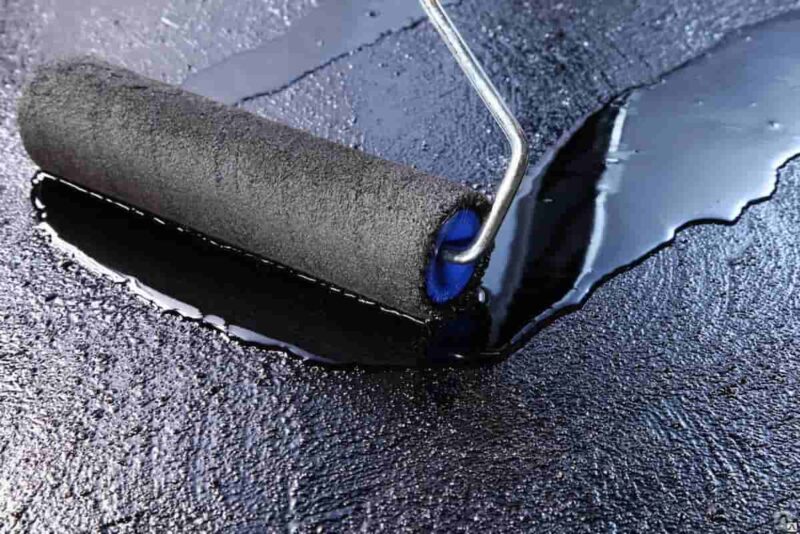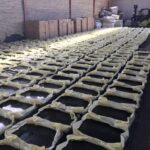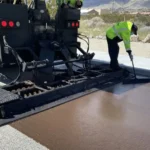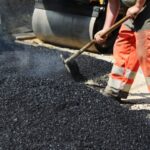🛢️ Oxidized Bitumen: Usage, Industrial Applications & Benefits
Oxidized Bitumen, also known as Blown Bitumen, Blown Asphalt or Oxidized Asphalt is a specially engineered form of bitumen produced by passing air through penetration-grade bitumen at high temperatures. This process alters the molecular structure, resulting in a product with a higher softening point, lower penetration, and improved performance under heat and load.
Used across multiple industries, oxidized bitumen delivers exceptional durability, thermal stability, and water resistance, making it a top choice for roofing, waterproofing, corrosion protection, and industrial sealing.
🧱 What Is Oxidized Bitumen?
Oxidized Bitumen is manufactured through an air-blowing process where hot air is introduced into penetration bitumen. This chemical modification results in a material that is more rubbery, less sticky, and better suited for applications where heat and chemical resistance are critical.
🔬 Key Characteristics:
-
High softening point (100–150 °C)
-
Low penetration (10–40 dmm)
-
Thermoplastic behavior
-
Excellent aging and chemical resistance
🛠️ Industrial Applications of Oxidized Bitumen
🏠 1. Waterproofing & Roofing
Oxidized bitumen is a leading material in roofing sheets, felt papers, and damp-proof membranes. It provides long-lasting waterproofing, even in high-temperature environments, and resists cracking or flowing under direct sunlight.
Oxidized Bitumen is commonly used in roofing and waterproofing applications. It is applied as a roofing membrane or coating to provide a protective barrier against water penetration. The increased viscosity of Blown bitumen helps it adhere to different surfaces, making it ideal for flat roofs, foundations, and basements. It offers excellent weather resistance, durability, and flexibility, ensuring long-lasting protection for buildings and structures.
🛢️ 2. Pipe Coating & Corrosion Resistance
Oxidized bitumen is extensively used for coating pipelines and underground metal structures due to its excellent adhesion, waterproofing, and chemical resistance. It forms a durable, protective barrier that shields pipes from moisture, soil chemicals, and corrosion. This makes it ideal for oil, gas, and water pipelines, extending their service life and reducing maintenance costs.
⚡ 3. Electrical Insulation
Oxidized Asphalt is widely used in electrical insulation applications due to its high dielectric strength, thermal stability, and moisture resistance. It serves as a protective coating for cables, transformers, and capacitors, helping to prevent short circuits and electrical breakdown. Its non-conductive nature and long-lasting performance make it ideal for industrial-grade insulation systems.
🏗️ 4. Expansion Joints & Concrete Sealing
It serves as a joint filler in bridges, pavements, and precast concrete structures, effectively handling thermal expansion and vibrations without degradation.
Blown Bitumen is utilized for joint filling and crack sealing purposes. The high viscosity and adhesive properties of Blown bitumen make it suitable for filling gaps and sealing cracks in asphalt pavements, concrete surfaces, and bridge decks. It forms a flexible and watertight seal that prevents further deterioration caused by moisture penetration, expanding and contracting with temperature changes.
🚧 5. Pavement Preservation
Oxidized Asphalt is also used in pavement preservation techniques. It can be applied as a surface treatment, such as a seal coat or rejuvenating agent, to extend the life of asphalt pavements. The Oxidized asphalt helps to restore the flexibility and durability of aging pavements, protecting them from oxidation, weathering, and fatigue cracking. It improves the skid resistance and waterproofing properties of the pavement, reducing maintenance needs and enhancing safety.
🚗 6. Soundproofing & Vibration Damping
In automotive and construction industries, Blown bitumen sheets and mats are applied for noise insulation and shock absorption, reducing mechanical vibrations and sound transmission.
Due to its increased viscosity, Oxidized Bitumen is used for sound dampening and anti-vibration applications. It is commonly used as a material for sound barriers, road noise reduction, and vibration isolation pads. The thick consistency of oxidized bitumen helps absorb sound waves and vibrations, reducing noise pollution and enhancing comfort in various environments, such as highways, railways, and industrial settings.
🖌️ 7. Paints, Adhesives & Sealants
Oxidized bitumen is a key ingredient in bituminous paints, industrial adhesives, and sealants due to its high viscosity, strong bonding properties, and weather resistance. It enhances the durability, flexibility, and waterproofing capabilities of coatings applied to concrete, metal, and wood surfaces. Commonly used in roofing, flooring, and infrastructure projects, it provides long-lasting protection against moisture and environmental stress.
📊 Comparison Table: Oxidized Bitumen Types & Usage
| Grade | Softening Point (°C) | Penetration (dmm) | Key Applications |
|---|---|---|---|
| 85/25 | 80–90 | 20–30 | Waterproofing membranes, pipe coatings, electrical insulation |
| 90/10 | 85–95 | 5–15 | Expansion joints, precast concrete, corrosion protection coatings |
| 95/25 | 90–100 | 15–25 | Roofing felts, adhesives, sealants |
| 105/35 | 100–110 | 30–40 | Pavement crack fillers, sound dampening sheets, bitumen-based paints |
| 115/15 | 110–120 | 10–20 | Industrial flooring, heavy-duty mastics, chemical tank linings |
✅ Key Benefits of Oxidized Bitumen
-
🌡️ Excellent Heat Resistance – Performs well in high-temperature environments.
Oxidized asphalt has a high softening point, allowing it to maintain structural integrity and performance even in high-temperature environments. This makes it ideal for hot climates and thermal exposure areas like roofing and industrial insulation.
-
💧 Superior Waterproofing – Ideal for roofs, tanks, and underground structures.
Thanks to its dense molecular structure and low permeability, oxidized bitumen delivers exceptional waterproofing. It’s commonly used in roofing systems, tank linings, and foundation coatings to prevent water ingress and moisture damage.
-
🧪 Chemical Inertness – Withstands acids, alkalis, and industrial chemicals.
One of the standout features of Oxidized asphalt is its resistance to chemicals, including acids, alkalis, and industrial solvents. This makes it suitable for chemical tank linings, pipeline coatings, and areas exposed to harsh substances.
-
⚒️ Durable & Long-Lasting – Extends life of coated structures and components.
Engineered to resist aging, cracking, and oxidation, oxidized bitumen ensures long-term protection for infrastructure and industrial installations. It requires minimal maintenance, reducing lifecycle costs.
-
🧲 Strong Adhesion – Bonds tightly to concrete, metals, and membranes.
It forms a robust bond with various substrates like concrete, metal, wood, and felt. This strong adhesion improves sealing performance in membranes, sealants, and adhesives under diverse conditions.
-
🎧 Acoustic & Shock Absorption – Reduces noise and vibration effectively.
Oxidized bitumen is also used in soundproofing and vibration-damping systems. Its flexible, dense structure helps absorb mechanical shocks and reduce noise, making it valuable in automotive, building, and industrial applications.
❓ Frequently Asked Questions (FAQ)– Oxidized Bitumen Usage
1. ❔ What is oxidized bitumen used for?
🔍 It’s used for roofing, waterproofing, tank coatings, pipe insulation, sealants, and chemical protection linings.
2. ❔ Is oxidized asphalt suitable for hot climates?
🌞 Yes, it has a high softening point, making it ideal for high-temperature conditions where standard bitumen would melt or flow.
3. ❔ Can it be used in waterproofing basements?
✅ Absolutely. Its moisture-blocking properties and strong adhesion make it a preferred material for basement and foundation waterproofing.
4. ❔ What form does oxidized asphalt come in?
📦 It is available in solid blocks, flakes, pellets, and drums, depending on the application and melting equipment used.
5. ❔ Is oxidized bitumen eco-friendly?
♻️ While it’s a petroleum-based product, its long life span and low maintenance contribute to reduced environmental impact over time.
🏁 Conclusion- Oxidized Bitumen Usage
Oxidized Bitumen stands out for its thermal stability, adhesion, chemical resistance, and waterproofing abilities. Whether you’re sealing roofs, protecting pipelines, or lining industrial tanks, it offers unmatched performance and durability. Its versatility across sectors makes it an essential material for infrastructure and industrial protection.
📣 Call to PARS Universal Bitumen
👉 Looking for premium-grade Oxidized Bitumen?
We in Pars Universal Bitumen, offer a range of Blown asphalt types like 85/25, 90/10, and 115/15, ideal for industrial and waterproofing applications.
📞 Get in touch today for technical specifications, MSDS, or competitive pricing!
🌐 Explore Our Bitumen Range → Pars Universal Bitumen: Oxidized bitumen
📧 Email: [email protected]
📞 Phone: +971 4 878 2031
🌐 Visit: Pub-ltd
🛒 Order Oxidized Bitumen Grades Today. If You have any other Query or Question you want to ask, Please don’t hesitate to Contact Us.




